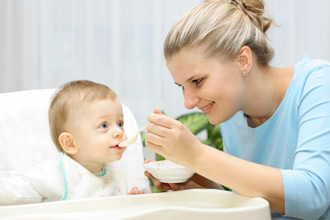New mums and bladder sensitivity
Congratulations – you're a proud mum! Now it's time to enjoy bonding with your baby, but how do you deal with changes to your body?

Congratulations – you're a proud mum! Now it's time to enjoy bonding with your baby – and all the beautiful moments this brings. Now is also the time that you may become aware of changes in your body, and you might be wondering how long it will take to bounce back into shape.
In much the same way as your tummy muscles will feel slack after giving birth, your pelvic floor muscles will have weakened too. Having a weak pelvic floor makes it harder for you to control your bladder, so you may find you're encountering little leaks when you cough, sneeze, laugh or lift something. The amount can vary from a few drops to enough to wet your clothes.
It's one of the most common problems experienced by new mums and there's absolutely no need to worry or feel embarrassed. There are loads of things you can do to help manage the condition, so nothing will hold you back from enjoying this special time to the full. Thanks to new Always Discreet, a range of products offering brilliant protection for sensitive bladder, you can forget worrying about any little leaks and concentrate on bonding with your baby instead.
Doing pelvic floor exercises three times a day can help strengthen these muscles, so that you can regain bladder control.
Here's how to do a pelvic floor exercise:
- After emptying your bladder, sit comfortably upright.
- Contract the muscles around your vagina, pulling upwards without using your bum or thigh muscles.
- Hold for at least four seconds before breathing out and slowly releasing the hold.
- Do this 10 times and repeat three times a day.
If you want to check how well you're doing, test your pelvic floor muscles when you go to the loo. Try stopping the flow of urine by contracting your muscles – if your control has improved, the exercises are working!
Wearing the Always Discreet product that best suits your needs every day will keep you fully protected against any unexpected accidents. Thanks to the unique highly-absorbent core, which locks away odour and wetness, and the exclusive OdourLock™ technology that neutralises odours instantly and continuously, you can feel reassured and confident. The liners and pads are up to 40% thinner* than the leading brand, yet offer twice as much absorbency than you may need.** The pants offer up to 100% comfort and protection.
Don't be tempted to cut down on fluids while you're experiencing a sensitive bladder – you need plenty of water if you are breastfeeding and to keep yourself hydrated. Caffeine, alcohol, fizzy drinks and artificial sweeteners can play havoc with a sensitive bladder, so limit your intake.
GoodtoKnow Newsletter
Parenting advice, hot topics, best buys and family finance tips delivered straight to your inbox.
For more information and advice on managing sensitive bladder after childbirth, talk to your health visitor or midwife.
Go to alwaysdiscreet.co.uk to request your free Always Discreet sample.
(*Compares to the leading brand (percentage varies across line-up). **Based on average consumer loading.)
Trusted, informative, and empathetic – GoodToKnow is the ultimate online destination for parents. At GoodtoKnow, our mission is 'simple': we're trying to make sense of parenthood. On the site, you'll find everything you need for a happy, healthy family life. Our huge archive of content includes more than 18,000 articles and 1,500 how-to videos. These include expert-backed advice features on parenting, dealing with relationship changes after having a baby, self-care for mums and managing your family finances. We also feature tried-and-tested product reviews and buying recommendations for every stage of family life - from prams and Moses baskets to birthday gifts and top toys.